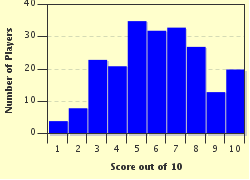Quiz Answer Key and Fun Facts
1. Pleonasms are used in everyday speech without us realising we may have spoken one. Which of the following common phrases is not an example of a pleonasm (redundant phrasing)?
2. A pleonasm is also considered to be a tautology, although the word tautology means "excessive phrasing", and therefore is more general than the redundant phrasing of a pleonasm. Tautologies are often found in legal documents as legal language contains a mixture of both English phrases with French and Latin phrases. They often contain one word derived from the English language and one from the French or Latin language. Also, one word is used to define the other word in legal documents.
Which one of the following does not include a tautology?
3. Often juxtaposing one language with another causes inadvertent pleonasms. The following physical features are all pleonasm except one. Which one?
4. Sometimes we may not realize we use pleonasms every day. Which one of the following phrases is NOT a pleonasm?
5. Sometimes oxymorons and pleonasms are hard to tell apart when, indeed, they are antonyms. Which one of the following phrases is the pleonasm?
6. Consider the words "planning", "reservation" and "warning". Which one of the options below when added before each of the three words, would create pleonasms in each case?
7. Pleonasms abound in the literature. Consider these examples from Samuel Beckett, William Shakespeare, Raymond Chandler and John Milton. Only one option does *NOT* contain a pleonasm. Which one?
8. There are two types of pleonasm. In syntactic pleonasms, the grammar of a sentence makes certain words redundant.
"I know that you are going to the theater with John". Which word is the pleonasm?
9. Semantic pleonasms come in two forms: overlap semantic pleonasms, where one word's semantic component is subsumed by the other ("I ate a tuna fish sandwich") and prolixity semantic pleonasms, which have words that add nothing relevant to the meaning of the sentence. Which one of the following is not an example of a prolixity semantic pleonasm?
10. Now that the scope of pleonasms has been discussed, for the final question can you determine which one of the following options is the oxymoron amongst the pleonasms (oxymoron antonyms)?
Source: Author
1nn1
This quiz was reviewed by FunTrivia editor
looney_tunes before going online.
Any errors found in FunTrivia content are routinely corrected through our feedback system.

